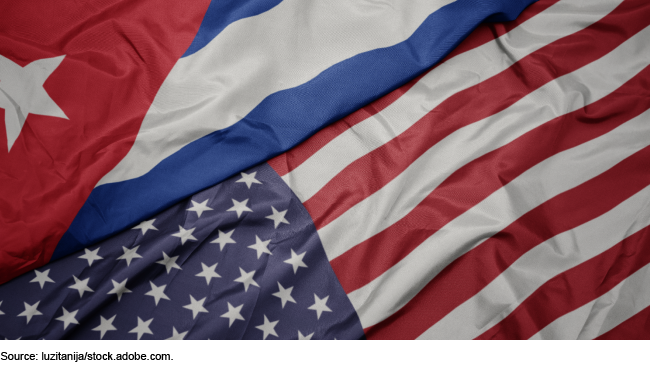Cuba Democracy Assistance: USAID Should Improve Collection of Security Risk Information to Help Awardee Mitigation Efforts
Fast Facts
The U.S. helps to promote democracy in Cuba through federal agencies and grants. But nongovernmental organizations and others receiving federal funds face potential backlash from the Cuban government.
Federal agencies—such as the U.S. Agency for International Development—work with awardees to identify these risks and prevent them. But we found that USAID doesn't have a process to gather and document security risk information for awardees before they start their work. As a result, USAID may not be sharing key information that could help awardees better protect themselves.
We recommended that USAID take steps to provide this information.

Highlights
What GAO Found
The U.S. Agency for International Development (USAID), the Department of State, and the National Endowment for Democracy (NED) provide general information on risks to Cuba democracy assistance awardees and take steps to help awardees mitigate risks at various points in the award process (see figure). For example, USAID and State award solicitations required applicants to analyze their risks and propose mitigation measures. USAID does not prepare security risk assessments for each award and does not have a documented process for collecting security risk information before implementation, limiting its ability to inform awardees' risk response.
General Cuba Democracy Assistance Award Processes

USAID, State, and NED address travel to Cuba and take steps to protect Cuba democracy assistance awardees or beneficiaries. USAID and State have worldwide protection programs that Cuba democracy assistance awardees can use to address security issues. In addition, USAID, State, and NED all refer awardees to protection programs available from the U.S. or other countries.
USAID, State's Bureau of Democracy, Human Rights, and Labor (DRL), and NED provide similar information about risks to Cuba democracy assistance awardees as they do to awardees in the two other restricted environments, but their award travel and liability provisions and procurement approaches differ. According to USAID and DRL officials, differences in the recent histories of the three countries have led them to take different approaches.
Throughout this publicly-released report, GAO has omitted specific details of USAID, State, and NED risk information, protection measures, and procedures that USAID and State considered sensitive.
Why GAO Did This Study
Cuba remains a one-party authoritarian state that restricts basic rights. Beginning in fiscal year 1996, Congress has regularly made appropriations available for programs seeking to promote democratic values and human rights in Cuba. The U.S. provides Cuba democracy assistance through USAID, State, and grant funding to NED, which in turn make awards to implementing partners. However, the Cuban government has opposed U.S. democracy assistance, resulting in security risks for awardees.
GAO was asked to review USAID, State, and NED security and risk mitigation measures for Cuba democracy assistance. This report is a public version of a sensitive report GAO issued in July 2024, which included four objectives. However, State and USAID deemed information related to one objective to be sensitive and protected from public disclosure. Consequently, this report addresses (1) information USAID, State, and NED provide to awardees regarding security risks; (2) protections they provide to awardees; and (3) how their risk information, award processes, and provisions for Cuba compare with those in other restricted environments. GAO reviewed USAID, State, and NED procedures and award documentation, and interviewed officials and a nongeneralizable sample of awardees.
Recommendations
GAO recommends that USAID develop a process to gather and document known security risks based on USAID’s and implementers’ experience in order to review and inform the actions of implementers. USAID concurred with the recommendation.
Recommendations for Executive Action
| Agency Affected | Recommendation | Status |
|---|---|---|
| U.S. Agency for International Development | The Administrator of USAID should ensure that the Office of Cuban Affairs works with USAID's Office of Security to develop a process to gather and document known Cuba democracy assistance security risks based on USAID's and implementers' experience prior to award implementation in order to review and, as appropriate, inform the actions of implementers. (Recommendation 1) |
When we confirm what actions the agency has taken in response to this recommendation, we will provide updated information.
|
